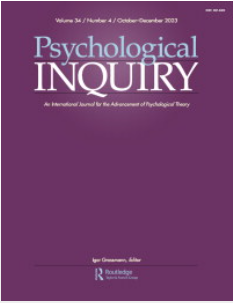Homeostasis as Affective-Motivational State: A Threat and Defense Perspective
IF 4.1
2区 心理学
Q1 PSYCHOLOGY, MULTIDISCIPLINARY
引用次数: 0
Abstract
There is much to like about the target article by Sedikides as, among other things the author illuminates the important psychological construct of personal identity. He suggests that the construction and protection of a desired identity is an essential component of the human body’s harm protection system which serves to promote psychological homeostasis and supports the immune system of the body. Importantly, Sedikides sees psychological and biological immunity as two components in a coordinated and adaptive system that helps humans to adapt best to their environment. In doing so, he does not just use the immune system as a metaphor but emphasizes the actual influence of psychological states on biological processes. In addition, his article presents meaningful content with regard to the processes of identity construction, maintenance and protection. Although the field of social psychology is rich in research on defensive processes, Sedikides illustrates the creation and adaptation of narratives and thereby advances our understanding of how such narratives may increase homeostasis and thus support immunity. The idea that a psychological immune system is coordinated with the biological immune system to protect humans from harm is compelling. However, questions remain pertaining to how this coordination process works? For the author the idea of psychological homeostasis is fundamental and can be described as a regulatory process by which individuals strive to feel good and therefore try to modulate their affect within an acceptable range. Similar to the regulation of body temperature or blood sugar, the human body’s self-regulation can experience ups and downs and varies on a continuum from accurate to biased self-views. However, without these temporal biases or deviations, which manifest in self-protection and self-enhancement processes, the body would not be able to regain psychological homeostasis which is important for each individual to function well. Indeed, without homeostasis biological adaptation would be impeded and biological fitness would be reduced. Therefore, the body not only needs various well-functioning biological systems but also a psychological maintenance system. Identity processes which are connected with the human ability for conscious reflection, abstract representation and linguistic communication are an essential part of this psychological maintenance system. Humans build on their capacity for differentiation, continuity, and agency (which they share to a certain extent with animals) as well as on specific human capabilities for meta-beliefs (i.e., self-views as well as global and specific narratives about individual characteristic, attitudes, abilities, and beliefs). Especially conscious reflection, abstraction, and projection help people to protect themselves from harm, to adapt to their environment and to effectively control the environment. However, personal identity not only comes with benefits but also with costs in the sense of emotional pain caused by the disruption of selfviews brought on by self-doubt and insecurity. Nevertheless, by adapting thoughts and beliefs about the self and those around them, people can create an interpretive space that allows them to construe their experiences and thereby regulate their emotions within a certain range. Sedikides proposes that people try to regulate affect while maximizing environmental control—however, to regain homeostasis he suggests that people sometimes have to compromise environmental control to regain well-being. As researchers coming from the field that examines how people defend against existential threat, we have focused on how the process of maintaining psychological homeostasis resembles a general process from threat to defense. First, we consider how discrepant self-views are similar and different to the definition of existential threat, suggesting that a systematic differentiation between situational conflict and existential concerns would be useful. Then, we turn to the process of psychological homeostasis (i.e., emotion regulation) and compare it with the affective-motivational process of anxiety reduction and approach reactivation. Following on from this, we reflect on identity protection strategies based on narratives, suggesting that a distinction between direct resolution and palliative defenses is important to better understand how adaptive processes help to maintain psychological immunity. In the final section, we discuss the interplay between personal and social identity mechanisms, suggesting that the concept of psychological immunity should be extended to a social immune system.作为情感动机状态的内稳态:一个威胁与防御的视角
塞迪基德斯的目标文章有很多值得喜欢的地方,除了其他方面,作者阐明了重要的个人身份的心理结构。他认为,构建和保护理想的身份是人体伤害保护系统的重要组成部分,它有助于促进心理稳态和支持身体的免疫系统。重要的是,Sedikides认为心理和生物免疫是一个协调和适应系统的两个组成部分,可以帮助人类最好地适应环境。在这样做的过程中,他不只是把免疫系统作为一个隐喻,而是强调心理状态对生物过程的实际影响。此外,他的文章还对身份的建构、维护和保护过程提出了有意义的内容。虽然社会心理学领域对防御过程的研究丰富,但Sedikides说明了叙事的创造和适应,从而促进了我们对这种叙事如何增加体内平衡从而支持免疫力的理解。心理免疫系统与生物免疫系统协同保护人类免受伤害的想法是令人信服的。然而,关于这个协调过程如何工作的问题仍然存在。对于作者来说,心理稳态的概念是基本的,可以被描述为一个调节过程,通过这个过程,个人努力感觉良好,因此试图将他们的影响调节在一个可接受的范围内。与体温或血糖的调节类似,人体的自我调节也会经历起起落落,并在从准确到有偏见的自我观点的连续体中变化。然而,如果没有这些在自我保护和自我增强过程中表现出来的时间偏差或偏差,身体将无法重新获得心理稳态,这对每个人的正常运作都很重要。事实上,如果没有体内平衡,生物适应就会受阻,生物适应性就会降低。因此,身体不仅需要各种功能良好的生物系统,还需要一个心理维护系统。认同过程是这一心理维护系统的重要组成部分,它与人的意识反思能力、抽象表征能力和语言交际能力有关。人类建立在他们的分化能力、连续性和能动性(在一定程度上与动物共享)以及特定的人类元信念能力(即,自我观点以及关于个人特征、态度、能力和信仰的全局和具体叙述)的基础上。特别是有意识的反思、抽象和投射,帮助人们保护自己免受伤害,适应环境,有效地控制环境。然而,个人身份认同不仅有好处,也有代价,即由于自我怀疑和不安全感而导致的自我观念的破坏所造成的情感痛苦。然而,通过调整关于自我和周围人的想法和信念,人们可以创造一个解释空间,使他们能够解释他们的经历,从而在一定范围内调节他们的情绪。Sedikides提出,人们试图在最大限度地控制环境的同时调节情感——然而,为了恢复体内平衡,他认为人们有时不得不牺牲环境控制来恢复幸福。作为研究人们如何抵御生存威胁的领域的研究人员,我们关注的是维持心理稳态的过程如何类似于从威胁到防御的一般过程。首先,我们考虑了不同的自我观点与存在威胁的定义是如何相似和不同的,这表明系统地区分情境冲突和存在关注是有用的。然后,我们转向心理稳态过程(即情绪调节),并将其与焦虑减少和方法再激活的情感动机过程进行比较。在此基础上,我们反思了基于叙事的身份保护策略,表明区分直接解决和姑息性防御对于更好地理解适应性过程如何帮助维持心理免疫力很重要。在最后一节,我们讨论了个人和社会认同机制之间的相互作用,表明心理免疫的概念应该扩展到社会免疫系统。
本文章由计算机程序翻译,如有差异,请以英文原文为准。
求助全文
约1分钟内获得全文
求助全文
来源期刊

Psychological Inquiry
PSYCHOLOGY, MULTIDISCIPLINARY-
CiteScore
10.30
自引率
1.10%
发文量
31
期刊介绍:
Psychological Inquiry serves as an international journal dedicated to the advancement of psychological theory. Each edition features an extensive target article exploring a controversial or provocative topic, accompanied by peer commentaries and a response from the target author(s). Proposals for target articles must be submitted using the Target Article Proposal Form, and only approved proposals undergo peer review by at least three reviewers. Authors are invited to submit their full articles after the proposal has received approval from the Editor.
 求助内容:
求助内容: 应助结果提醒方式:
应助结果提醒方式:


